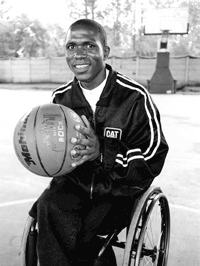
A PATERNALISTIC AND PATRONISING ATTITUDE
by Samuel Kabue

|
A PATERNALISTIC AND PATRONISING ATTITUDE
by Samuel Kabue |
 Peter Mawindo, member of Zimbabueís national wheelchair basketball team and advisor to the 8th assembly of the WCC ©Chris Black / WCC |
People with disabilities have been misunderstood, overlooked and sometimes outrightly discriminated against for too long. To restore their confidence and trust will thus require a very careful approach. Pastors and evangelists will not only need to dig deep into the word of God to understand His will for and promise to them, but also to understand their feelings, aspirations and specific spiritual needs. It is in this respect that we need to understand the effects of the paternalistic and patronising attitude with which the church leaders view people with disabilities and how this, in turn, affects the way they act and behave towards them. More often than not, church ministers, pastors, evangelists and other church leaders will praise a person with a disability in church, telling others or sometimes the entire congregation how cheerful that particular person is in spite of his or her disability. Rarely is there a reasonable cause for such remarks. What those who make them fail to realise is that they have a deeply negative impact on those who are addressed and the person being referred to. They serve only to magnify the presence of the disability, ignoring the personís other characteristics. This is interpreted to mean that such a person is good, cheerful, etc., but would have been even better if he or she did not have a disability. This is a totally mistaken idea. It ignores the truth about human diversity in terms of characteristics as well as the fact that disability does not mould one into a cheerful person. These remarks, whether made at church or elsewhere, are embarrassing and people with disabilities usually find some way of avoiding them. They may withdraw or adopt other, more conspicuous, characteristics on which those meeting them could focus instead of their disabilities. Withdrawal at times takes the form of people with disabilities banding together, discussing their experiences and treatment and in the process, guiding each other into activities in which they consider recognition is easier to attain. Quite often such activities will not be church-related. Attempts to shift focus from disability may take different forms. A friend in a wheelchair recently told me that she finds it very comforting to be accompanied by her dog. Those who meet her usually remark about the lovely dog rather than about her and her disability. She receives compliments for having looked after her dog so well. The dog becomes the subject rather than her. This is a clear indication on how disabled people would prefer to have people focus on something positive about them rather than just their disability. Some of these approaches may not be practical in a church setting and this will mean a choice between them and going to church. In my friendís case, she uses this approach outside the church but still goes to church, where she tries her best to use her musical talent to attract positive attention. What people with disabilities want is for the pastor to let them be human. They would prefer that he did not focus on a single unique attribute to ensure them a special place. They would be much happier if pastors were to help parishioners to get over their discomfort with people with disabilities and thus prevent their exclusion from the spiritual, social and development life of the church. Closely related to this problem and equally destructive is the general assumption that people with disabilities all share the same social behaviour, emotional maturity and sometimes even beliefs. Disabilities have very little if anything to do with individual cognitive or affective processes. People with disabilities are therefore very different from each other in the way they think and in personality. There should not be any reason to believe that one disabled person is religious just because you know another one who is religious. In the same way, there is no reason to assume that a disabled person is a Christian because he or she is among a congregation unless there is a personal confession to that effect. This tendency has at times made people with disabilities feel that their disabilities are an acceptable substitute to individual commitment to the faith and thus a concession in the heavenly pilgrimage. The burdens of sin are neither physical nor sensory and cannot therefore, be eliminated or even reduced by physical or sensory disability. There should be no exception when the Lord says "come unto me all ye that labour and are heavy laden and I shall give you rest". (Matt. 11:28) Samuel Kabue |